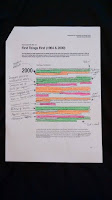After reading about a 2014 FTF Manifesto, I looked it up to see if it had any major differences from the 2000 and 1964 manifesto's that were noteworthy or potentially useful. I found it here, and after trawling through the signatories for a considerable amount of time, as well as more general searching on the internet, interestingly enough, Ken Garland doesn't seem to be a signatory, nor is he acknowledged at the bottom of the site as having shown 'overwhelming support' or providing 'promotional support and coverage'.
What I Gained
I found that it continued the change made from 1964 to 2000 in it becoming increasingly political and reinforcing the feeling of blaming designers. The main difference this time was it's focus on technology in an attempt to make it more relevant to more people outside the industry. Key points were:
- Inclusion of 'creative technologists' in the 'we are' section.
- Lack of gender, race and age diversity in creative industries.
- Accusing some designers of aiding the abuse of the law and human rights.
- The re-inclusion of not wanting to take the fun out of life.
Potentially useful quotes:
Next Steps
Having established that there's nothing particularly groundbreakingly useful or interesting about FTF 2014 in relation to my topic, I don't feel the need to look into it any further, and will return to looking at how Nietzsche's ideas have been reflected in film to assist my ability to articulate them in the future.
Having established that there's nothing particularly groundbreakingly useful or interesting about FTF 2014 in relation to my topic, I don't feel the need to look into it any further, and will return to looking at how Nietzsche's ideas have been reflected in film to assist my ability to articulate them in the future.



